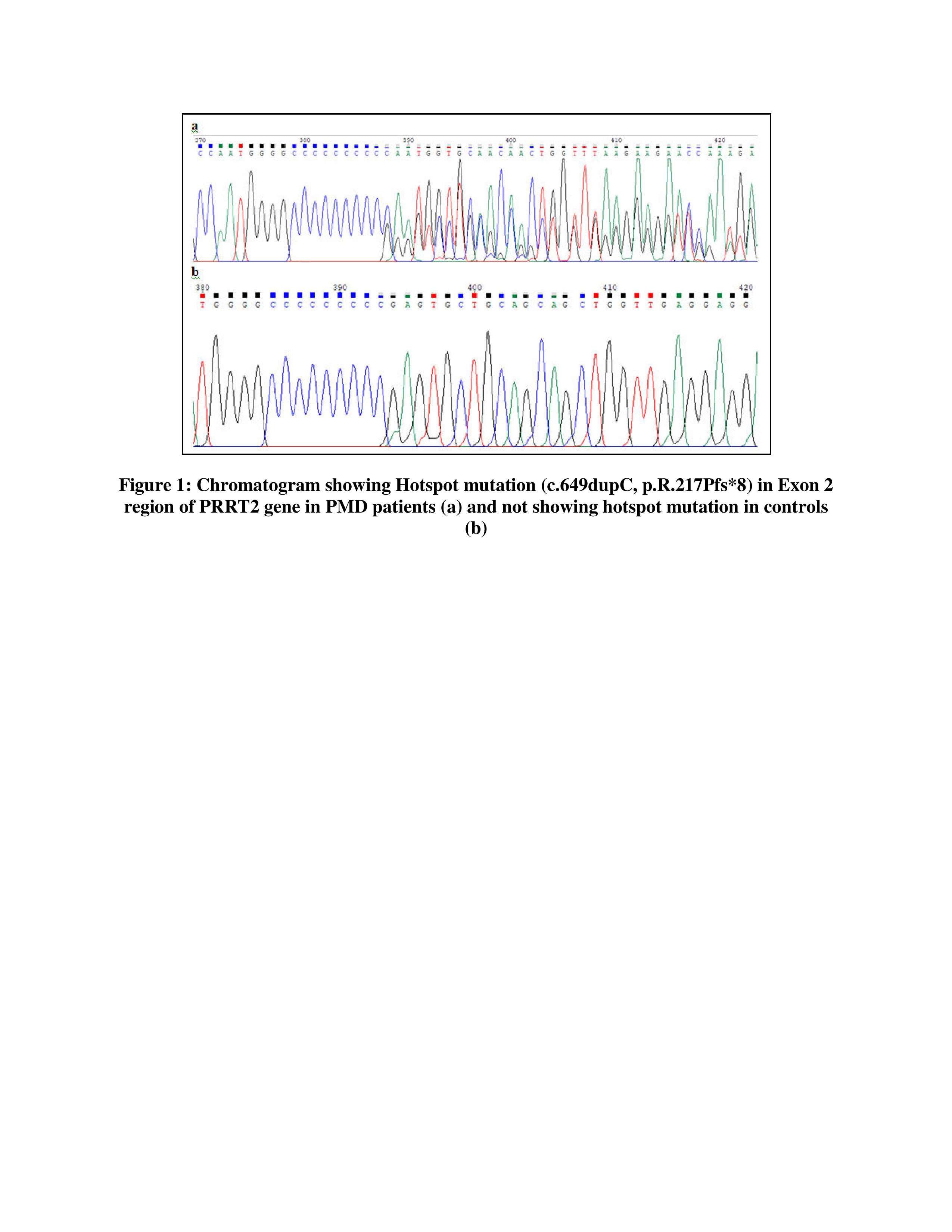Category: Genetics (Non-PD)
Objective: To explore the clinical and genetic features of Paroxysmal Movement Disorders by using Whole Exome Sequencing.
Background: Paroxysmal movement disorders (PMDs) comprise both paroxysmal dyskinesia and episodic ataxia, characterized by attacks of dystonic and/or chronic movements and cerebellar ataxia respectively (1). The clinical symptoms of many PMDs are overlapping in nature and it is very difficult to classify specific type of PMD in patients. This project explains the new advancement in screening of candidate genes and its mutation in PMDs, which may help in proper classification of overlapping PMDs.
Method: Totally 55 PMD patients and 34 family members were recruited for this study. PRRT2 gene sequencing was carried out for 55 PMD patients using Sanger method as per Prabhakara et al.,2021 (2). Further, 20 PMD patient samples and 3 family members was processed for Whole Exome Sequencing by Next Generation Sequencing (NGS) method. Identified novel genes will be analyzed and validated by using direct-PCR and Sanger sequencing methods.
Results: Among 55 cases, 9 turned positive showing hotspot mutation (c.649dupC, p.R.217Pfs*8) in the exon 2 region of PRRT2 gene (figure 1). Three families showed incomplete penetrance of PRRT2 gene (table 1). Among 20 patients, 12 were clinically diagnosed as Paroxysmal Kinesigenic Dyskinesia (PKD), 3 were Paroxysmal Non-Kinesigenic Dyskinesia (PNKD), 1 was Dystonia, 3 were Benign Familial Infantile epilepsy and 1 was Hemiplegia. The results of the Whole Exome Sequencing (WES) of 20 PMD patients have been shown in the table 2. The WES data showed various genes such as TMEM151A for Episodic Kinesigenic dyskinesia, PRRT2 for Paroxysomal choreoathetosis; Episodic Kinesigenic dyskinesia, Benign Familial infantile seizures, SCN1A for Familial febrile seizure, KMT2B & ANO3 for Dystonia, ATCAY for Cayman Cerebellar ataxia, and ATP1A2 for Alternating hemiplegia, played significant role in the respective PMD phenotypes.
Conclusion: The candidate genes obtained from the study will be developed as gene panels for PMDs. This study will provide further evidence for the precise diagnosis of the disease and serve as a solid basis for genetic counseling and prenatal gene diagnosis for family members of PMDs.
Figure 1
Table 1
Table 2
Table 2 Contd.
Table 2 Contd.
References: 1. Méneret A, Roze E. Paroxysmal movement disorders: an update. Revue neurologique. 2016 Aug 1;172(8-9):433-45.
2. Prabhakara S, Rao HH, Prashanth LK, Anbazhagan K, Jacques R, Reddy BK. PRRT2 gene mutations in Indian paroxysmal kinesigenic dyskinesia patients. Annals of Indian
Academy of Neurology. 2021 May;24(3):425.
To cite this abstract in AMA style:
P. S, R. Sampath, P. L K, V. Gowda, A. Kolandaswamy. Identification and Screening of Candidate Genes for Paroxysmal Movement Disorders by Next Generation Sequencing Approach for Developing Molecular Diagnostics. [abstract]. Mov Disord. 2024; 39 (suppl 1). https://www.mdsabstracts.org/abstract/identification-and-screening-of-candidate-genes-for-paroxysmal-movement-disorders-by-next-generation-sequencing-approach-for-developing-molecular-diagnostics/. Accessed July 14, 2025.« Back to 2024 International Congress
MDS Abstracts - https://www.mdsabstracts.org/abstract/identification-and-screening-of-candidate-genes-for-paroxysmal-movement-disorders-by-next-generation-sequencing-approach-for-developing-molecular-diagnostics/





